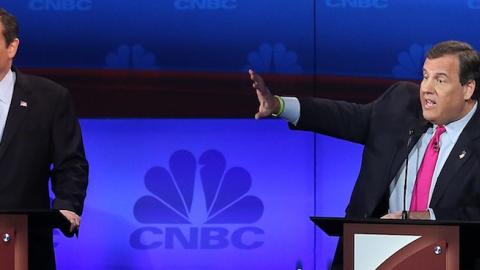In his interview with the Atlantic's Jeffrey Goldberg, New Jersey governor Chris Christie explains that the Obama administration has got it wrong. "Iran is a greater threat than ISIS. If you're prioritizing the threats, which a president has to do, then I think that Iran is a greater threat than ISIS," said Christie. "I believe Iran is moving toward obtaining a nuclear weapon. I have no proof at this point that ISIS is moving toward obtaining weapons of mass destruction."
The Republican presidential candidate who has taken some criticism for being a little weak on foreign policy has hit the nail right on the head. The Islamic Republic is the clear and present danger. It will have a nuclear bomb within the next 15 years and has destabilized the entire Middle East, from the eastern Mediterranean to the Persian Gulf. Its expansionist policies, as the Tehran regime likes to boast, have left it in control of four Arab capitals—Beirut, Damascus, Baghdad, and Sanaa. The Islamic State is in part a function of Iranian policy. It is because the regional Sunni Arab majority believes that it has been left to the mercies of Iran that many have aligned themselves with a brutal terrorist group. Any campaign against ISIS, no matter how many European powers sign on to the coalition as Germany did today, is doomed to fail unless Sunnis can be peeled away from the organization and persuaded to turn their weapons against it. And that won't happen until Iran is knocked back down to size. Instead, the White House paved the way for Iran's nuclear weapons program.
It's useful to compare Christie's homespun wisdom—a soon-to-be nuclear state sponsor of terror is more dangerous than a terror organization (and one that may enjoy Iranian backing)—not only with White House policy but also with the proposed Middle East policy of another GOP presidential candidate.
Earlier in the week, Ted Cruz argued that ISIS is the real threat. Obama has yet to formulate an effective strategy, Cruz told the AP. But the Texas senator said he would keep it "very simple." "We win and they lose," said Cruz. The other winner is the Iranian axis, because in Cruz's view, the United States is safer with Tehran and its allies in control of the Middle East. For instance, Syrian president Bashar al-Assad is a "bad man," said Cruz, but toppling him would be "materially worse for U.S. national security interests."
That's a peculiar take since the facts are pretty simple. Assad started the war against the Sunni population. He created a humanitarian catastrophe and destabilized the Middle East and now threatens Europe as well. For it is Assad who is responsible for the bulk of the refugee problem, much more so than ISIS, because it's his sectarian war that put military age Sunni males to flight.
Of course the White House thinks the same way Cruz does—America is better off with Assad. That's why the administration is supporting only rebel groups that sign promises not to use their U.S. training or U.S.-supplied arms against the Assad regime, but only against ISIS. Ever since Obama said in August 2001 that Assad should step aside, the administration's Syrian policy has been a subset of its Iranian nuclear policy. The president doesn't want to push out Iran's Syrian ally for fear Tehran might crash the nuclear deal, his signature foreign policy initiative.
Cruz's pro-Assad take also aligns him with Russian president Vladimir Putin. Since the beginning of the uprising nearly 5 years ago, Moscow's position has been non-negotiable—Assad stays. A few European leaders, like Francois Hollande, continue to demand the Syrian dictator's removal, but most have folded, and perhaps Paris will as well in time. Insofar as the Europeans concede Putin's position, it is because they have no choice. They hope that by getting on Putin's good side they might be able to win some concessions from the man who now calls the shots in Syria, especially now that Putin's military escalation is adding to the number of Sunni Arabs seeking refuge in Europe. Maybe Putin will hear reason, they think, they hope—it doesn't matter because they have nowhere else to go. Obama is not picking up the phone.
In other words, in siding with Obama and Putin's Assad policy, Cruz is endorsing the absence of American leadership. I, too, Cruz is saying, will sit by idly as the Middle East burns and now threatens to ignite Europe. Just today, after all, Austrian authorities arrested a 20-year-old Iraqi Shiite militant with ties to Iran's Islamic Revolutionary Guards Corps. It's not just Sunni Arabs who are heading to the continent, but also Shiites, as well as Iranians. As I argued a few weeks ago, the Sunni-Shiite conflict is becoming a world war.
With so much at stake, American voters as well as our allies are crying for American leadership after two terms of leading from behind. Right now it looks like Ted Cruz is facing the wrong direction. Chris Christie, however, has his eye fixed on the real problem.















